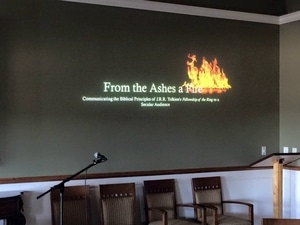
From the Ashes a Fire: A senior honors project
Ashley Silvey, Staff Writer
Editor’s Note: Ashley Silvey is a part of the Honors Program here at North Greenville University. She recently presented her honors project, that is required of all graduating seniors with honors, along with a group who will be graduating this December.
Photo courtesy of Ashley Silvey
While often times I find myself dreading presentations, my senior honors project was different. I can honestly say I have learned more about creative writing, ministry and J.R.R. Tolkien’s The Fellowship of the Ring in one semester of independent study than I ever thought possible.
The objective of my thesis, to communicate the biblical principles of The Fellowship of the Ring to a secular audience, was founded on the overarching questions of “How can I use my passion for creative writing as a tool for sharing the Gospel?”
“From the ashes a fire” was an excerpt from a poem in the novel and it struck me as portraying the idea of hope and redemption that I wanted my research to encapsulate.
My research focused intensely on an analysis of eight key characters in whom Tolkien reveals different aspects of humanity. The characters that were investigated were as following: Frodo Baggins, Samwise Gamgee, Gandalf the Grey, Saruman the White, Aragorn, Boromir, Gollum and Sauron.
Each character proved to display one or more of six prevalent topics in the text. The topics of fate and choice were shown through Frodo’s appointment as the Ring-bearer but his eventual decision to step into his fate.
The remaining topics that were discussed included good versus evil, compassion, friendship and hope.
The results of my research yielded irrefutable references to a biblical worldview. Tolkien’s Christian faith was so innate to who he was that his works naturally reflected the depth of his character and beliefs.
Through the topics and the various facets of mankind that are accentuated in the novel, Christians are able to share the Gospel message in a less intimidating manner to people who are not yet believers. By using literature as a building block for discussion, time for relationship building is afforded and discussion is a vast deal more open for controversial issues.

